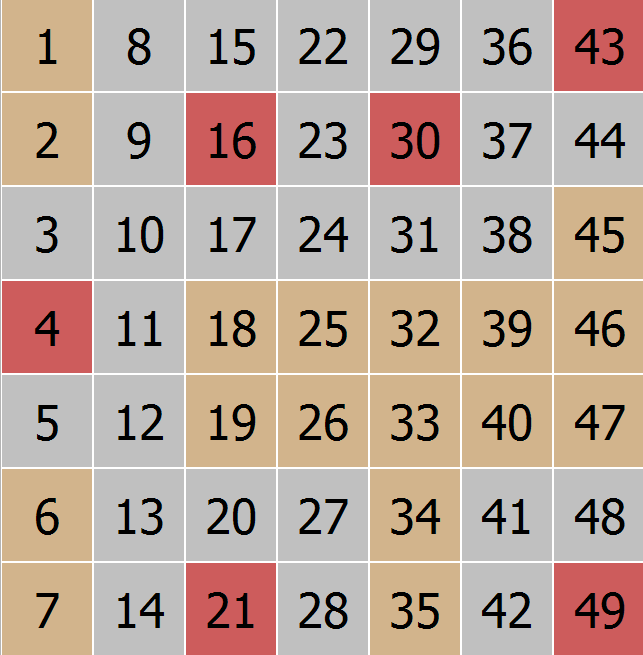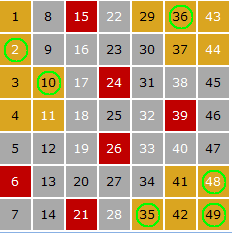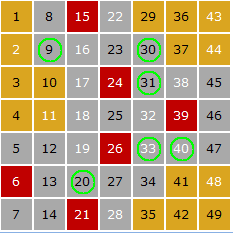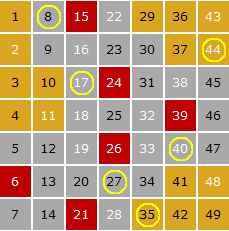Numbers can be classified as Odd or Even, but they can also be categorized as Contact, Outside, Hot, Cold, Connected, Unconnected, or Disconnected. However, a number cannot simultaneously be Odd and Even or Contact and Outside, as these are opposites, but they can be classified in conjunction with other types.
For example, the number 1 can be classified as Odd, Contact, Hot, and Connected. Each number can be classified in various configurations of these types.
In a lottery game, many numbers are drawn, so in a draw, there might be several numbers classified as Odd, several as Contact, etc. In this analysis, you can examine how they occur together in various combinations.

To visually indicate the contact numbers, we will display them on our game layout view with a different background color. In the sample picture below, the contact numbers are painted in grey and are the numbers that surround the drawn numbers.

Please note that the lottery draw numbers (4 16 21 30 43 49) are themselves also considered a Contact numbers.
The remaining numbers that are not part of the drawn contact numbers are referred to as the Outside numbers.
In this manner, the entire game is consistently divided into two distinct groups of numbers: Contact and Outside numbers. This concept applies to all game types, including keno and pick games.
In the majority of lottery drawings, and in almost every game, there is an unequal distribution of the numbers.
For example, in game 6/49 we may have like 2 contact numbers drawn and 4 outside, or 3 contact and 3 outside etc.
You can check it out how the numbers are drawn using Visual Analyser and its Types Of Numbers section.
Here is the example of bad numbers choosing:

All numbers on the ticket above are exclusively outside type numbers (circled in green). It is quite uncommon for a new lottery draw to include only outside numbers.

All numbers on the ticket above are exclusively outside type numbers (circled in green). It is quite uncommon for a new lottery draw to include only outside numbers.

Above are the optimal numbers. Some of them are contact numbers, while others are outside numbers.
For example, if you want to see how many Contact type numbers were drawn, select from the Visual Analyzer menu:
Types of Numbers > Occurrences of Contact numbers
The diagram shows how the Contact numbers occur in general.

If numbers were not drawn as contact numbers, then a diagram will show a point in row 0. If numbers were drawn as contact numbers, then the diagram will show a point in the row indicating how many contact numbers were drawn. The next diagrams will analyze numbers that were drawn as the selected number type and in combination with other types.
Each game draw is different, and therefore, each time the contact and outside numbers are different as well.
Use the Visual Analyser feature to observe how many numbers are drawn and how often.
In the majority of games, those numbers are mixed, so it is a good idea to choose both types of numbers.
Of course, in some games, from time to time, only contact or only outside numbers are drawn.
But if that event happens, you just lose one chance out of many better chances.
Choosing both types significantly increases the number of right combinations to use and eliminates many that are unnecessary to play with.
Please visit our Visual Lottery site to learn about the visual analysis concept and diagrams.